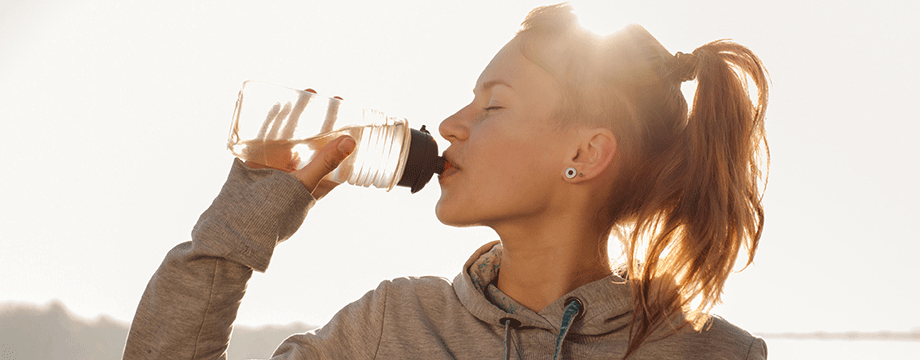Water works

Don’t get dehydrated when out and about exercising this summer. Find out what advice the Rude Health experts have for you
The role of water
“Water regulates your body temperature and helps lubricates your joints,” says Thomas McNeill, manager at Club Vitae at the Clayton Hotel in Belfast. “It also helps transport nutrients to give you energy and keep you healthy. If you’re not properly hydrated, your body can’t perform at its highest level. You may experience fatigue, muscle cramps, dizziness, or more serious symptoms. The average person will need to drink at least two litres of water every day, this amount will increase based on the person’s activity levels throughout each day.”
Dr Catherine Norton is Lecturer in Performance Nutrition at the University of Limerick. “To allow sweating to occur we need to be adequately hydrated,” she explains. “Poor hydration can have many consequences on athletic performance, and in extreme circumstances can also have serious health complications such as heat stroke. Achieving adequate hydration status before an event and maintaining this throughout will avoid these drops in performance.”
How much hydration?
“Many factors should be considered when devising fluid strategies for athletes including clothing, body composition and physical activity level,” says Dr Catherine Norton. “Humidity and wind speed should be considered as well as temperature. The hotter the environment in which we exercise the more dehydrated we can become.”
“While we never quite reach tropical temperatures here in Ireland, the warmer weather that starts to come in over the summer can increase the amount we sweat during exercise,” says Carl Cautley, a personal trainer and founder of Health & Fitness Together in Ranelagh, Dublin. “The more you sweat, the faster you dehydrate, so this is definitely something to be aware of as the seasons change.”
Choosing the best fluids
“Water should always be your go-to fluid, but it depends on the intensity and duration of your exercise,” says Carl Cautley. “Sports drinks and gels that contain carbohydrates and electrolytes can be useful during endurance activities and hot weather workouts. But for the vast majority of exercisers, it’s best to stick to water.”
“Water will replace fluid loss unless you are exercising for more than an hour in normal conditions and over 30 minutes in warmer conditions,” says Thomas McNeill. “In that case, you can drink a low-calorie electrolyte replacement drink to restore sodium and potassium lost through sweating. Some people may dislike the taste of these drinks, so unsweetened iced tea or a beverage lightly flavoured with a bit of juice is a good compromise.”
After exercise
“Avoid carbonated drinks – they can create unpleasant gas and result in stomach cramps,” says Thomas McNeill.”Don’t justify calorific drinks just because you’ve exercised – you probably don’t need the extra calories unless you are trying to gain weight. If you prefer not to drink during your workout, make sure you finish a one-litre bottle afterwards.”
“Broadly speaking athletes should aim to rehydrate, refuel and replenish the electrolytes lost in sweat efficiently after exercise,” says Dr Catherine Norton. “Generally this means using a fluid that contains carbohydrates and electrolytes. Those hoping to lose weight or alter body composition may not need carbohydrates. Individuals with greater electrolyte losses, ‘salty sweaters’, may also have different requirements. Consider the demands of the exercise session and the longer term goals of the individual.”
Are you dehydrated?
“Some of the typical signs that you are getting dehydrated include dry mouth and thirst, lowered blood pressure, headaches, and dizziness; muscle fatigue; dry, cool skin; feeling lethargic and irritable and lack of urine,” says Thomas McNeill. “If you are feeling any of these symptoms, it is time to drink some water!”
“Early stages of dehydration can manifest as thirst, dry mouth, headache, fatigue, dizziness or muscle cramps,” says Carl Cautley. “If you notice any of these symptoms, stop exercising immediately, sit or lie down and sip some water or a sports drink, allowing your fluids to replenish gradually.”
“By the time you feel thirsty you are already dehydrated,” says Dr Catherine Norton. “Weighing yourself before and after an exercise bout can be helpful. Changes in weight (80kg pre and 78kg post) indicate that you have lost 5kg of wet weight in that session. Each 1kg loss should be replaced with 1–1.5L of the most appropriate drink to that individual. In high performance environments urinalysis is used to gauge hydration status. So try to take opportunities to rehydrate during your sport during breaks in play, half time or at drinks stops.”
www.claytonhotelbelfast.com
healthandfitnesstogether.ie
More Rude Fit articles...
Articles from our latest issue...